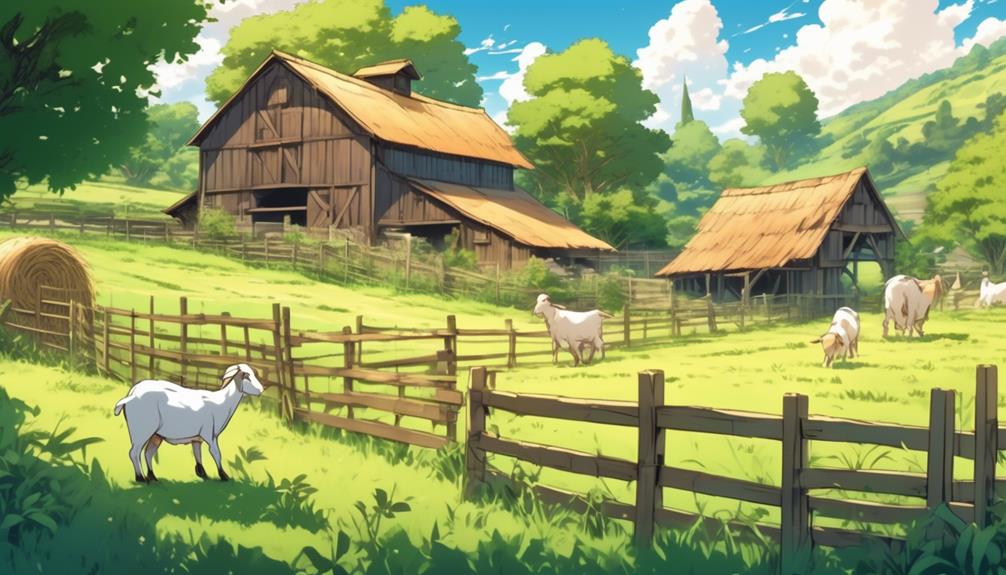Are you considering adding goats to your life, but feeling a bit overwhelmed by the prospect of taking care of these curious creatures?
Well, fear not! Just like any new endeavor, goat care comes with its own set of challenges and rewards. In this discussion, we will explore some essential tips that will help you navigate the world of goat care with confidence and ensure the well-being of your new furry friends.
So, hold on to your hats (or should I say, goat horns?), because we’re about to embark on a journey of knowledge and goat-tastic adventures!
What Goats Need…
- Provide goats with proper housing, including shelter with at least 20 square feet of space, good drainage, and bedding material during winter months.
- Construct a strong fence at least four feet high to prevent escapes and consider electric fences or woven wire fences for added protection against predators.
- Design outdoor space with varied terrain, elevated platforms, and sturdy toys to provide goats with exercise and prevent boredom.
- Ensure goats have a balanced diet consisting of good quality hay, grains, and access to clean water, and establish a regular feeding schedule. Regular grooming and hygiene practices are also important for their overall health and well-being.
Housing Requirements
To meet the housing requirements for your goats, it’s essential to provide them with a suitable shelter. Each goat should have at least 20 square feet of space in the shelter. This ensures that they’ve enough room to move around comfortably. Additionally, the shelter should have proper drainage to prevent any water accumulation. A dirt floor is recommended for this purpose.
During the winter months, it’s important to provide bedding in the shelter to keep the goats warm and comfortable. Straw or wood shavings can be used as bedding material. This will help insulate the shelter and provide a cozy environment for the goats.
In terms of fencing, it’s crucial to have a strong fence to prevent any escapes. The fence should be at least four feet high and can be made of electric wire, woven wire, welded wire, or cattle panels. This will ensure that your goats remain safely within their designated area.
Furthermore, outdoor space is also important for goats. They should have access to a fenced run with at least 200 square feet of space per goat. This allows them to exercise and roam around freely. Additionally, a constant supply of fresh water should be available to keep them hydrated.
‘Did you know? Goats have rectangular pupils, which give them a wide field of vision and excellent depth perception. This unique eye shape helps them navigate their surroundings and avoid predators.’
Fencing and Containment
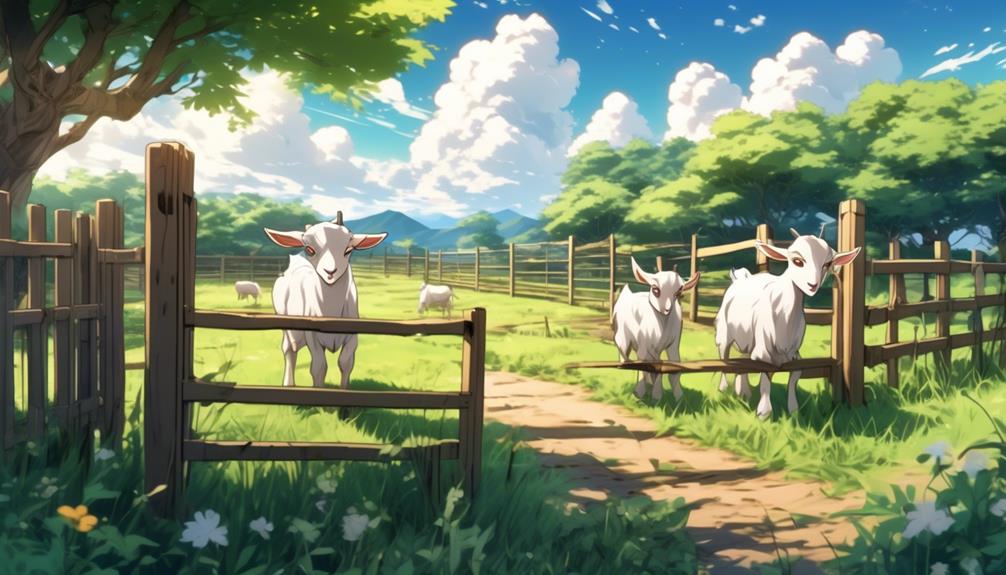
Now let’s focus on ensuring the safety and containment of your goats with proper fencing. Building a sturdy fence around your goats’ pen is crucial to prevent them from wandering off and protect them from predators.
Goats are notorious escape artists, so it is essential to invest in a high-quality fence that they cannot easily climb or knock down.
When selecting the right fence for your goats, consider these factors:
| Type of Fence | Pros | Cons |
|---|---|---|
| Electric Fence | – Effective deterrent for most goats – Affordable – Easy to install | – Requires a power source – May not be suitable for all goat breeds – Can cause injury if not installed correctly |
| Woven Wire Fence | – Provides excellent protection against predators – Long-lasting – Suitable for all goat breeds | – Expensive compared to other options – Requires professional installation – May require periodic maintenance |
| Chain Link Fence | – Durable and long-lasting – Provides good visibility – Keeps predators out | – Expensive upfront cost – May not be suitable for small or young goats – Requires professional installation |
Goats are indeed known for their remarkable ability to escape from enclosures. Whether it’s their natural curiosity or their inherent agility, goats can be quite persistent when it comes to finding a way out. As a result, it is crucial to invest in a well-designed and sturdy fence to keep them contained.
When selecting a fence for goats, there are a few key factors to consider.
First and foremost, the fence should be tall enough to prevent the goats from jumping over it. A fence height of at least 4 to 5 feet is recommended for most goat breeds, although larger or more athletic goats may require taller fences. Additionally, the fence should be constructed using materials that goats cannot easily climb or push through.
One of the most common types of fences used for goats is woven wire fencing.
This type of fence consists of tightly woven horizontal and vertical wires, creating small square or rectangular openings. The small size of the openings prevents goats from squeezing through or sticking their heads out, reducing the risk of injury. Woven wire fences are durable and can withstand the pressure and weight of goats leaning or rubbing against them.
Electric fencing is another effective option for containing goats.
Electric fences emit a mild electric shock when touched, which acts as a deterrent for the animals. It is important to ensure that the electric fence is properly grounded and that the voltage is set at an appropriate level to be effective without causing harm to the goats.
Regardless of the type of fence chosen, it is crucial to regularly inspect and maintain it. Goats are persistent and can find weak spots or damage in the fence over time. Regularly check for loose wires, broken posts, or any other potential weak points that could be exploited by the goats. Repair any damages promptly to maintain the integrity of the enclosure.
In addition to a reliable fence, it is also important to consider the size of the grazing area for the goats. Providing them with ample space to roam and graze can reduce their desire to escape. Goats are natural browsers and providing them with access to a variety of vegetation within their enclosure can help keep them content.
Finally, it is essential to consider the temperament and behavior of individual goats when designing the fence. Some goats may be more determined or adept at escaping, requiring extra precautionary measures such as adding an additional electric wire or extending the fence height.
“Did You Know? Goats are natural climbers and have been known to scale trees and even vertical rock faces with ease. Their agility and climbing abilities make it even more important to have a secure and sturdy fence to contain them.”
Outdoor Space and Exercise
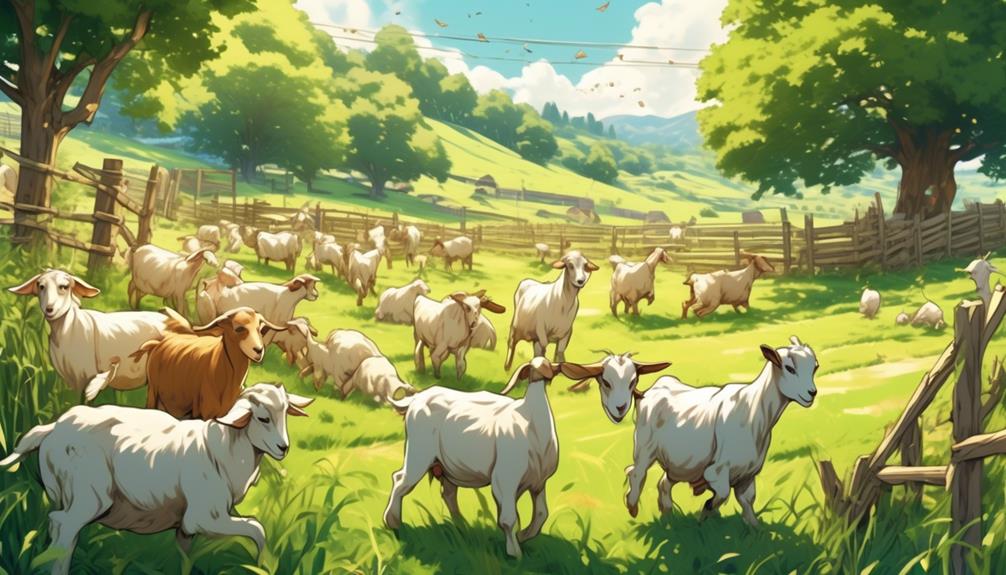
Creating an outdoor space that provides ample room for exercise is essential for the health and well-being of your goats. Did you know that goats are natural climbers and love to explore their surroundings? They’re known for their agility and enjoy climbing and jumping.
When designing your outdoor space, consider incorporating structures like elevated platforms, ramps, and sturdy toys to provide them with exercise and entertainment. You can also create obstacles and mazes using rocks, logs, or hay bales to stimulate their natural curiosity and keep them mentally stimulated.
In addition to space and exercise, it’s important to provide your goats with a variety of terrain. Goats thrive when they have access to grassy areas, rocky patches, and wooded areas, as it mimics their natural habitat and keeps them engaged. Each goat needs a minimum of 200 square feet of space to move around comfortably.
Regular exercise isn’t only important for the physical health of your goats but also for their mental well-being. It helps prevent boredom, reduces the risk of obesity, and promotes overall vitality. So, when planning your outdoor space, remember to prioritize ample room for exercise and provide your goats with opportunities to explore, climb, and play.
Proper Feeding and Nutrition
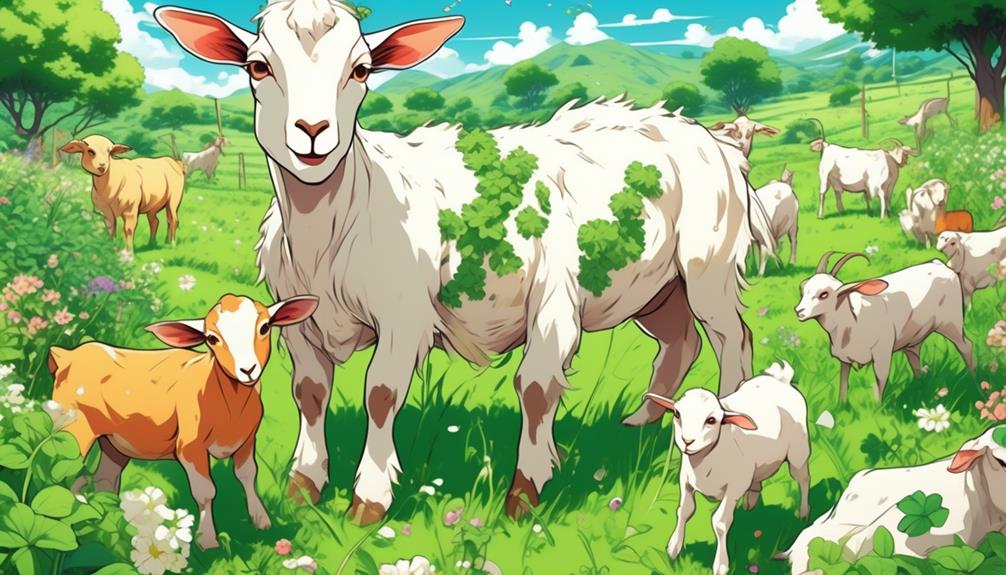
When it comes to ensuring the overall health and well-being of your goats, proper feeding and nutrition play a crucial role. Providing a well-balanced diet is essential for their growth and development. Here are some important tips to keep in mind when it comes to feeding and nutrition for your goats:
- Hay: Make sure to provide good quality hay, such as timothy or alfalfa, as it’s a staple in a goat’s diet. Hay provides essential nutrients and fiber that aids in digestion and keeps their rumen healthy.
- Grains: Along with hay, goats can benefit from a grain supplement. Grains like oats, corn, and barley can provide additional energy and nutrients. However, it’s important to remember that grains should only make up a small portion of their diet, as an excessive amount can lead to health issues.
- Fresh Water: Access to clean and fresh water is crucial for your goats’ well-being. Make sure to provide a constant supply of water, especially during hot weather or when they’re lactating.
- Minerals and Supplements: Goats require certain minerals and vitamins for optimal health. Consult with a veterinarian to determine if your goats need any specific supplements, such as calcium, phosphorus, or copper.
- Feeding Schedule: Establish a regular feeding schedule to ensure consistency. Goats thrive on routine and predictability, so try to feed them at the same time each day.
‘Did You Know? Goats are known for their ability to eat a wide variety of plants, including some that are considered poisonous to other animals. This adaptability is due to their unique digestive system, which allows them to break down and process a wide range of plant materials.’
Routine Care and Maintenance
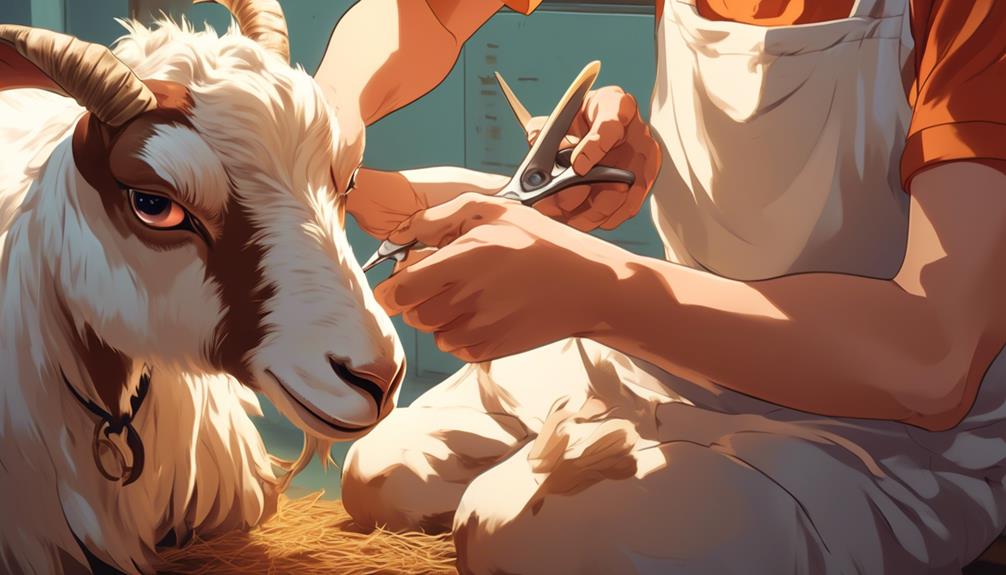
To ensure the overall health and well-being of your goats, it’s vital to establish a regular routine for their care and maintenance. Routine care involves various tasks such as feeding, hoof care, and overall monitoring of their health.
Feeding your goats is an essential part of their routine care.
Goats are herbivores and require a balanced diet consisting of high-quality hay, pasture, and grains. Make sure to provide fresh and clean water at all times. Additionally, it’s important to monitor their food intake to ensure they’re getting the right amount of nutrition.
Hoof care is another crucial aspect of routine maintenance.
Regularly inspect your goats’ hooves for any signs of overgrowth, cracks, or infections. Trimming their hooves every few months will prevent discomfort and potential hoof problems. Additionally, providing a clean and dry environment will help minimize the risk of hoof issues.
In addition to feeding and hoof care, routine care also involves monitoring your goats’ overall health. This includes observing their behavior, body condition, and checking for any signs of illness or injury. Regularly consult with a veterinarian to ensure your goats receive the necessary vaccinations and preventive treatments.
Establishing a routine care and maintenance schedule won’t only help keep your goats healthy and happy but also create a sense of belonging and connection with your animals. By taking proactive steps in their care, you’re providing them with the best possible environment to thrive.
Breeding and Kidding Essentials

Understanding the breeding cycle and recognizing the signs of heat and pregnancy is essential for successful goat breeding. Breeding goats involves careful planning and preparation to ensure healthy offspring and a smooth kidding process.
Here are some essential tips to help you navigate the breeding and kidding journey:
- Prepare a suitable birthing area: Create a clean and comfortable space for your goats to give birth. Provide soft bedding, such as straw or shavings, and ensure the area is protected from drafts and predators.
- Educate yourself on the kidding process: Familiarize yourself with the stages of labor and potential complications that may arise. Learn how to assist a doe during kidding if necessary, but also be aware of when to intervene and when to let nature take its course.
- Provide proper care and nutrition: Pregnant and nursing goats require a balanced diet to support their increased nutritional needs. Consult a veterinarian or experienced breeder to create a feeding plan that includes high-quality hay, fresh water, and appropriate mineral supplements.
- Research goat breeds: Different breeds have different characteristics and suitability for breeding. Consider factors such as milk production, temperament, and adaptability to your climate and environment.
- Assess the climate and environment: Ensure that the climate and environment in which your goats will be raised are suitable for breeding and kidding. Extreme temperatures or harsh weather conditions can pose risks to both the doe and her kids.
‘Did You Know? Goats have a unique breeding behavior called “seasonal polyestrous.” This means that they experience multiple heat cycles throughout the year, typically during the fall and winter months.’
Health Management and Prevention
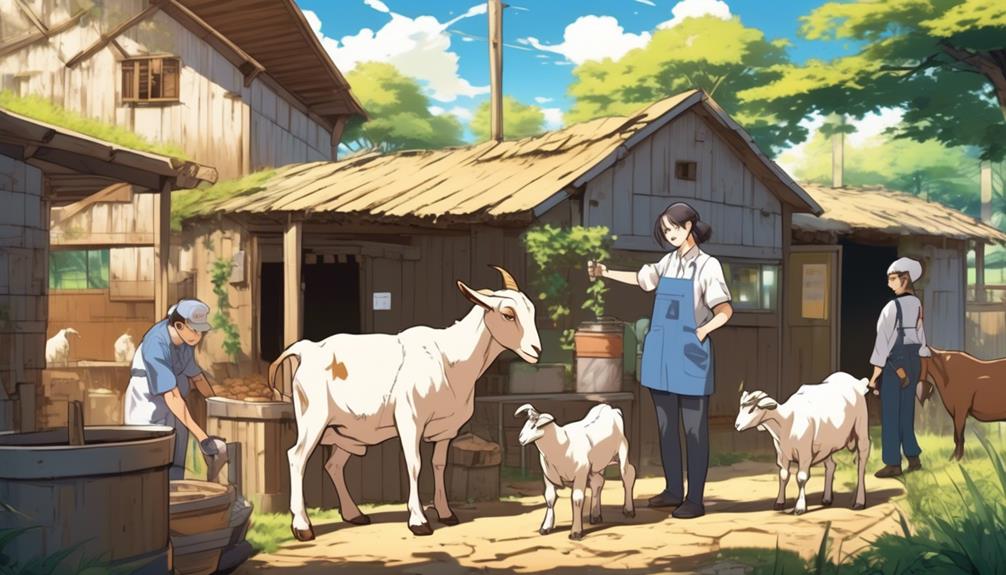
Implementing a regular deworming and vaccination schedule is crucial for maintaining the health and well-being of your goats. Goats are susceptible to various internal parasites, such as worms, which can cause weight loss, anemia, and even death if left untreated. By following a proper deworming protocol, you can prevent these issues and keep your goats healthy.
Caring for goats also involves providing them with a balanced diet.
A diet consisting of high-quality hay, grains, and fresh water will support their overall health and boost their immune system. Additionally, it’s important to monitor your goats regularly for any signs of illness or injury. Early detection is key in preventing and managing health problems. If you notice any abnormalities, seek veterinary care promptly.
To protect your goats from harsh weather and potential health hazards, ensure they have proper shelter and fencing. Clean living conditions are also essential for their well-being. Regularly clean their bedding and remove any feces or contaminated materials.
Educating yourself on common goat health concerns is vital. Familiarize yourself with conditions such as coccidia and urinary calculi. Understanding the importance of minerals and supplements for optimal goat health will also help you provide the necessary care.
Grooming and Hygiene Practices
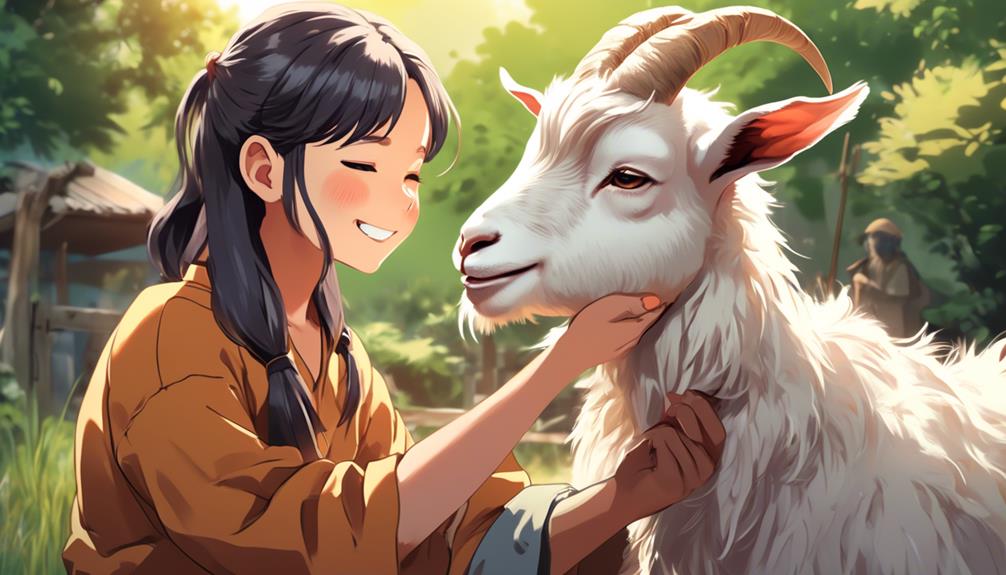
Regular grooming and hygiene practices are essential for maintaining the health and well-being of your goats. By incorporating these practices into your routine, you can ensure that your goats are clean, comfortable, and free from common health issues.
First and foremost, regular hoof care is vital for your goats. Trim their hooves regularly to prevent overgrowth, which can lead to discomfort and lameness. By keeping their hooves in good condition, you’re ensuring that they can move around easily and avoid any potential hoof-related problems.
In addition to hoof care, brushing your goats’ coats is another important grooming practice. This helps remove dirt, debris, and parasites from their fur, keeping them clean and healthy. It also allows you to check for any skin issues or abnormalities that may require attention.
Don’t forget to pay attention to your goats’ ears, eyes, and teeth as well. Regularly check these areas for any signs of infection or dental issues. Clean their ears gently and inspect their eyes for any redness or discharge. Similarly, keep an eye on their teeth to ensure they’re healthy and not causing any discomfort while eating.
Lastly, bathing your goats as needed is essential for their hygiene. Use gentle soap and warm water to cleanse their bodies, taking care not to stress them out during the process. Additionally, applying a suitable insect repellent will protect them from flies and other pests, ensuring their comfort.
‘Did You know? Goats have a natural ability to climb steep and rocky terrain? This is due to their specialized hooves, which have two flexible toes that provide them with exceptional balance and grip.’
Happy Healthy Goats…
Congratulations on taking the first step towards becoming a successful goat owner! By following these essential care tips, you’ll ensure the happiness and well-being of your goats.
Remember, goats are social creatures and thrive in a herd environment, so be sure to provide them with companionship. Don’t forget to gradually introduce new goats to the herd and create a stimulating and stress-free environment. With proper housing, nutrition, and grooming practices, your goats will be healthy and content.
